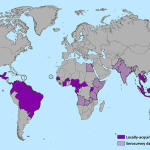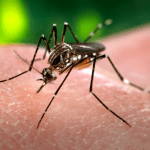Zika Virus expands its’ grip
Dr Rowena Sheppard, TMA Cressy Clinic Goondiwindi, Qld
Dominating the headlines, particularly for travellers to South America, is the very recent information on spread of mosquito borne Zika Virus, with notifications now in at least 30 countries, some in alarming numbers.
Having just returned from a family wedding in Colombia, it seems hard to believe we were amidst an epidemic. Suddenly there is news of 20,000 Colombians being afflicted with the virus, and an expectant air of tragedy to follow, if the case rate from afflicted pregnant women carries through to high rates of foetal abnormalities, in particular microcephaly.
The mood on the streets seemed blissfully unaware, and the peoples from this part of the world continue to rate close to number one for happiness.
So much about this virus remains unknown, and we are very much at the observational & information gathering stage. For the individual traveller it seems prudent to take maximum protective measures to minimise the risk posed by this virus and its’ vector.
What does the Zika Virus do?
In the main, those infected with the Zika Virus usually have quite a mild flu like illness. It is only in very recent months that a causal link appears to be emerging between pregnant women contracting the virus, and the potential for severe brain effects of the virus on the unborn foetus.
Microcephaly is where the brain is underdeveloped in all areas. The condition can vary from mild to severe. The infants may be slow to feed, slow to gain weight, slow to achieve childhood developmental milestones, can have visual, and hearing problems, seizures and can have varying levels of intellectual impairment. Other viruses such as Rubella and CMV (cytomegalovirus) have long been known to be able to cause Microcephaly. In many cases, the cause is unknown, but Zika is the first mosquito borne virus (known as an arbovirus) to cause this.
The strain on families, local health providers, and specialist care providers in these relatively poor countries is immense.
Possible sexual transmission of Zika virus
Though it must be emphasised that the vast majority of Zika virus infections are mosquito borne, a further twist in the Zika story is that of cases emerging of sexual transmission of the virus from males returning from Zika affected areas.
In one case Zika has continued to be detected in semen for 9 weeks post exposure. As a consequence to this finding, the department of health has issued the following guidelines:
Men who have travelled to areas with ongoing Zika virus transmission whose partner is pregnant should abstain from sexual activity (vaginal, anal, or oral) or consistently use condoms for the duration of the pregnancy, whether symptomatic or asymptomatic.
Men who have had a confirmed Zika virus infection, whose partner is not pregnant should abstain from sexual activity (vaginal, anal, or oral) or consistently use condoms for 3 months following the resolution of symptoms
The WHO is also reporting a significant increase in Guillain Barre Syndrome – which causes progressive, but not always reversible, paralysis. GBS can occur as a late sequel to Zika virus infection with recent multiple fold increase in notifications occurring recently in Colombia and Venezuela.
So what is to be done?
The main protection is in avoidance:
· Pregnant women, and women of childbearing age should seriously consider cancelling any travel plans to afflicted countries.
· Those women of child bearing ago who do elect to go to these countries should have good contraceptive measures in place and be extremely vigilant with personal protective measures against mosquito bites.
· Everyone going to these zones should apply insect repellent at regular intervals during the day. Be aware that the sting of the Aedes Aegyptii mosquito is mild or even painless. Aussies are used to having a few mosquitoes around and would often not even register being stung – USE the repellent. Wear Long Sleeves, Light coloured clothing. If you also use sunscreen, put it on BEFORE the repellent.
Report any symptoms to your doctor
· Zika virus infection causes headaches, rash ,conjunctivitis, joint and muscle aches. The incubation period is 3-12 days after being bitten and symptoms are typically mild ,lasting 3-5 days.
· Other diseases such as dengue, chikungunga and malaria have similar symptoms and world distributions, and may also need exclusion.
· Pregnant women who contract the virus will need prompt specialist input into their care.
· Employ safe sex measures to prevent sexual transmission.
Laboratory diagnosis is generally accomplished by testing serum or plasma in the early phase and then again at the convalescent phase (2-3 weeks later)
If affected with Zika virus, continue to use vigorous insect repellent routine to prevent spread of the virus into local Mosquito populations, particularly if you live in north Queensland and parts of central Queensland, where the Aedes vector is known to be present. We have recently witnessed Department of Health initiated vector control teams undertaking fumigation in areas in Rockhampton where Zika has been diagnosed in return travellers.




